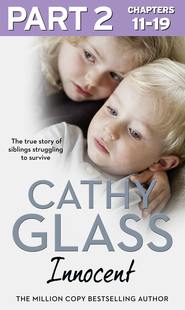По всем вопросам обращайтесь на: info@litportal.ru
(©) 2003-2024.
✖
Cathy Glass 3-Book Self-Help Collection
Автор
Год написания книги
2018
Настройки чтения
Размер шрифта
Высота строк
Поля
The morning routine
A good working routine is essential now your child is at nursery, as you will be expected to have your child there on time, washed, dressed and breakfasted, not rushing in late (and irritable) from having being dragged out of bed. Apart from allowing your household to run smoothly, routine gives your child security and reassurance, and reduces confrontation. If Tom knows he has to be up and dressed at a certain time every morning, or have his bath at 7.00 p.m. every evening, then he will be expecting it, and be less likely to put up resistance.
I am talking here not about a dogmatic and inflexible routine, such as that which some child-rearing gurus enforce on a child right from babyhood, but a sensible working routine that accommodates all family members and allows the household to run smoothly. Obviously always allow plenty of time in the morning for the things you have to do before you leave the house. Leaving in a last-minute dash will find you stressed, short on patience, and with frustration and confrontation setting in when Tom dawdles. The morning routine you develop now will continue with some modification when your child starts school.
Use the 3Rs to put your routine in place. For example: Tom has to get up and dressed in the morning ready for nursery, but getting ready at a set time can often cause a young child a problem. First, Request Tom to get dressed, having laid out the clothes he is to wear:‘Tom, it’s time to get dressed now, ready for nursery.’Say it positively, expecting Tom to do as asked (even if experience has taught you that that is unlikely). If Tom doesn’t do as you have asked within a reasonable time, then Repeat the Request:‘Tom, get dressed now, please. We don’t want to be late for nursery. What would you like for breakfast?’Adding this question or something similar – for example,‘What would you like to do after nursery?’– will give Tom something else to think about rather than not getting dressed.
If Tom still refuses, then Reassure and Reaffirm, with the offer of helping him dress. Although Tom can dress himself, children can and do regress at this age, and it is better to reduce your expectations a little and offer help, if it achieves what you want with cooperation. If there is still no cooperation from Tom, despite your offer to help him, or if Tom resists you, then remind him of the sanction for not complying with your Reasonable Request:‘Tom, I want you to get dressed now, please. I don’t want to stop your television time’(or whatever sanction you are using). If he still refuses, then say,‘Tom, I’ve asked you three times to get dressed. You’ve lost ten minutes’ television time. Get dressed now; you don’t want to lose twenty minutes.’Tom will soon realise that the longer he refuses to comply with your Request, the more of his treat (of television) will be lost. Obviously you must remember to impose the sanction, as not seeing it through will quickly undermine your authority and render this and future sanctions ineffective.
If, having had previous negative experiences, you foresee a problem – for example, Tom not getting up, refusing to have his bath or go to bed – then allow extra time for completing what you want Tom to do. Make sure the needs of any other siblings have been met before you see to Tom, so that you can concentrate on him, his routine and what he has to do, without interruption.
Regression
Although this is a very exciting time for your child, with so many possibilities and expectations it can also be a very frightening time. Apart from simply leaving toddlerhood behind, nursery and preschool, there may also be a new baby in the house. Often at this age a child will revert to less mature behaviour – whining, or asking for the return of a bottle, a pacifier or even a nappy, all of which were dispensed with some time before.
It is up to you how you deal with a minor and short-term regression. Do what you feel comfortable with, but be careful not to over-indulge the regressed behaviour, as it might become a habit that could be difficult to break. I don’t see a problem in letting a four- or five-year-old try a bottle again as long as it’s a fun activity, where you talk to your child about how sucking on the bottle feels, and how great it is that he or she no longer needs a bottle and can drink from a ‘grown-up’ cup and use a knife and fork. However, I would never indulge a child’s whining or tantrums as part of regressed behaviour, and I wouldn’t recommend putting a nappy on a child of this age (when they are dry) or returning a pacifier that is no longer needed.
If your child suddenly, genuinely and dramatically regresses in his or her development and behaviour on all levels, view it as a warning sign that something is wrong. If a child is very anxious about something, there is a comfort in returning to a ‘baby state’ where he or she had no responsibility and had all his or her needs simply by crying. If there is no apparent reason for the regression, such as a new baby, then talk to your child and try to find out what is troubling him or her. Obviously give lots of reassurance, whatever the reason, and if the regression persists for months and impacts on the child’s life, seek medical advice.
I sometimes foster children of this age and older (seven, eight and nine) who regress on all levels when they first come into care. Often these children have never had a childhood, played or gone through the developmental milestones, because they had adult responsibilities and concerns thrust upon them. They have raised themselves and looked after the house, often because their parents were too drink and drug dependent to do the job, so there was never any time or opportunity for the child to be a child; often these children know how to cook and clean, make up babies’ bottles, wind babies and change nappies (from raising their younger siblings). It is so very sad, for they have no idea how to play.
When they come into care and are finally relieved of the huge and inappropriate burden they have carried all their lives, they can regress dramatically in the first few months. An eight-year-old will return to crawling rather than walking, eating with his fingers, wanting a dummy or bottle, baby talking, wetting and soiling himself, and generally acting like a toddler. I allow much of the child’s regressed behaviour in the first few months, as they settle in and begin to adjust to the new environment and feel safe. It can be quite unsettling to have a sturdy nine-year-old boy crawling on all fours, babbling baby talk and wanting to be picked up and carried like a baby. However, I know from experience that the child will gradually work through the developmental stages he or she previously missed, and will catch up again.
Such behaviour underlines just how important these early developmental stages are for children, particularly the time to be a child and play. If deprived of childhood, then given the opportunity, the child instinctively sets about working through these stages before they can go forward and develop. If a child is permanently deprived of a childhood and never given the opportunity to catch up, it can produce emotional and psychological problems in adulthood. Some therapy encourages regression, with the therapist helping the adult client to feel and work through these early years’ stages.
Nursery anxieties
Children may need a lot of reassurance at this age, particularly when they first start nursery. So if, for example, Tom is refusing to get ready in the morning because he is worried about going to nursery, then talk to him about his concerns while you help him dress, and again for longer in the evening when there is more time. Your child will find comfort in the knowledge that you are tuned into his or her fears and can offer support and suggestions. Spend a lot of time talking and listening to your child at this age, and include in your conversation general talk about nursery, during which it is likely you will be able to pick up concerns your child may have and reassure him or her.
Be on the lookout for hidden worries. If a previously well-behaved child suddenly becomes wilfully challenging, has tantrums, refuses to get dressed ready for nursery or starts bed-wetting, hear warning bells. It could be that your child is anxious about something but doesn’t like to say. Even the most outwardly confident child will have some worries when starting nursery and may well feel too embarrassed to tell you, believing his or her worries are foolish and not experienced by others. It’s surprising what little things can seem huge to a child at this age:
I can’t remember the teacher’s name.
I don’t know how to switch on the tap in the washroom.
Who will help me do up my coat?
Matthew said there’s a ghost in the playhouse.
No one likes me/No one will play with me/I haven’t got any friends.
Wayne pinches me.
Lucy won’t let me join in.
What if I wet myself?
Treat your child’s worries seriously, and never laugh at or minimise them, even if they appear ridiculous: they are not ridiculous to the child. Reassure your child by answering any questions such as ‘Must I drink my milk at break time?’ and if you don’t know the answer, find out by asking the nursery staff the question your child doesn’t feel able to. Be in close contact with the nursery staff and make them aware of any concerns that your child might have which you haven’t been able to deal with simply by reassuring your child.
Behaviour and character
A child becomes autonomous – i.e. a self-governing individual with freedom of action – almost from the day he or she is born. Gone is the early Victorian attitude where young children were viewed as objects, lacking the adult capability to think, feel and make decisions; now we recognise that a child is an individual who is developing his or her autonomy right from the beginning and we respect his or her character. This is far healthier, but more demanding for the parents, than the Victorian ‘seen and not heard’ approach. There is a leap in autonomy when the child becomes mobile, and another huge leap when he or she starts preschool. Although seeing your child turning into a self-regulating individual with character is exciting, and a reward for all your love and attention, it can also be very challenging if your child’s character doesn’t fit snugly alongside yours or your partner’s, which it won’t sometimes.
The more your child’s world opens up, the more autonomous he or she will become, and the more obvious his or her individuality. Your child’s character, including his or her likes, dislikes, temperament, wishes, demands and refusals, all go together to make up your child. Many of your child’s character traits will gel happily with yours, while others may make you wonder exactly who this little person is. How often do you hear a shocked parent exclaim, ‘Where did that come from?!’ or ‘Where did he get that?!’ in relation to a trait in a child’s character (positive or negative) that is not part of the parent’s behaviour. Some of this will simply be part of the child growing up and experimenting with how they want to be, but other aspects will be the child’s character forming – his or her individuality and personality, which you will accommodate while maintaining the boundaries for good behaviour.
Children are not cloned; they are not physically identical to their parents. So there is no reason why their characters should be identical either. Obviously genes, environment and upbringing play a large part in shaping a child, but ultimately they will become their own person. You will find some of their character traits very appealing, while you may not like others. And while you should encourage your child’s autonomy and individuality, you should never allow the child to overrule you and your guidelines. You are the adult, and from years of experience you know what is best for your child.
As unacceptable as the badly behaved child is, so too is the precocious child, who has been brought up to believe that the whole world revolves around them, that their view is the only one and that others are there to fit in with them. The preschool age group has an abundance of this type of child whose parents have over-indulged all their whims, in the mistaken belief that they were encouraging individuality. The parents take pride in what they have done and point out the child’s resulting (precocious) behaviour to anyone who will listen:
Claire insists on having her tea at her little table in front of the television, instead of eating with us.
Tom will only wear Adidas [designer] trainers.
Claire prefers older children. She finds children her own age a bit babyish.
All of the above, and more, I have heard said recently by proud and doting parents of rising fives, who misguidedly believed they were encouraging positive individuality in their child, but were actually encouraging precociousness and storing up trouble for later. Claire should have been made to sit at the table for a family meal (using the 3Rs technique if she resisted). Tom’s materialistic attitude to footwear is likely to land him and his parents in the bankruptcy court, as well as encouraging an unhealthy emphasis on the labels of clothing rather than functionality. And for Claire to be viewing her peer group as beneath her is not only elitist and derisory but will also be a big hindrance to her making friends.
As with so much of successful parenting, it is a matter of balance. Encourage your child’s autonomy and individuality, but don’t let your child take over and take charge. At this age, with the child’s growing sense of liberation and independence, and being away from you at nursery, there is the potential for him or her to try to take the reins. If he does, you could wake up one morning to find your life totally revolving around your child’s, with your personality being swamped by theirs. If you feel this is already happening, and your control is being eroded, then rein in your child. Put in place your routine and boundaries and ensure positive and age-appropriate behaviour using the 3Rs:
* Request – your child to do something or stop doing something in a friendly but firm manner.
* Repeat your Request.
* Reaffirm – if your Request with the added warning that a sanction will follow, or give a reward if your request has been complied with. Remember that the reward need only be verbal – ‘Good girl/boy’ – but praise is always important.
CHAPTER THREE More Techniques (#)
Before going on to the next age group, five to eight, it is worth pausing for a moment to look at some very important issues.
The importance of respect
We have seen some additions to the 3Rs – Reassure becomes Reaffirm when disciplining, and rules are put in place using the 3Rs technique. Respect is another important R, possibly the most important: both respect from your child to you and other family members, and the respect you show your child.
The reason you Request your child to do something rather than demand is out of the respect you have for your child. You wouldn’t demand something of another adult (unless you wanted a punch on the nose), and neither should you ever demand or command your child to do something. Always treat your child with the respect you would show another adult, and which you expect to be shown. Use an even, polite voice (it can still be firm) when addressing your child and be considerate of his or her feelings. The dictionary definition of respect is ‘a feeling of admiration for someone because of their qualities or achievements', which sums it up nicely. Admire your child – he or she has already achieved an awful lot in a few short years – and always insist your child shows you the same admiration and respect, whether they are aged three or twenty-three.
If your child is disrespectful, either through words or through actions, then modify his or her behaviour using the 3Rs, Requesting: ‘Tom, don’t speak to me like that, please. How should you ask for something?’ And when Tom rephrases his request, praise him – ‘Good boy, that’s better.’ Don’t ignore small acts of disrespect as left unchecked small acts will grow into bigger acts of disrespect, with the result that your authority, and therefore discipline, will be severely undermined.
You don’t need me to tell you what respect feels like: when treated in an admiring and polite manner we glow with an inner warmth. Conversely, disrespect, both from adults and children, stings and makes us feel worthless; if it is allowed to continue it grows like a canker, undermining our sense of self-worth and confidence. Politeness is a big part of respect: teaching your child to say please and thank you; not to snatch and grab; to request rather than demand; to be aware of and respond to others’ feelings and wishes; to cooperate and have patience – all help him or her become respectful.
There is a saying that ‘What goes around comes around', and treating your child with respect will certainly reap its own rewards: he or she will copy your behaviour and treat you with the same respect. Children reflect the behaviour they see around them, positive and negative; they absorb it subconsciously like a sponge. If your dealings with your child are always respectful, then your child will be more likely to use this behaviour as his or her baseline, in attitude both to you and the family, and to others outside the home. I’m not saying there won’t be times when your child needs to be corrected for being disrespectful – of course there will be, at all ages, and particularly when external influences come in, in the form of nursery and the school playground. But the respect you show your child will become the accepted norm, and your child will model his or her attitude to others on how he or she has been treated by you.
So often when I see the children I foster with their natural parents, I see a complete absence of respect, not only from the children to their parents and vice versa, but also between the parents themselves, and from the parents towards other adults. It is so sad, and it makes working with these families and trying to rebuild relationships very difficult. No one listens to anyone, as each person focuses solely on their own needs, shouting orders, commands and insults, oblivious to each other.
If the situation has been like this for years, by the time the children are teenagers the ‘family’ is no more than a set of very selfish, self-centred and unhappy individuals who orbit and collide with each other in a chaos of demands and wants. It often comes as a revelation to the parents to learn that their child (or partner or other adult) has, and is entitled to, their own viewpoint and feelings, and that those feelings should be treated with respect.
Respect is crucial, both for a healthy family and for an individual to function successfully in society. It has been suggested that the lack of respect now seen in many children is responsible for the growing crime rate among minors. Respect can be achieved by using the 3Rs and summed up in the following:
* Don’t demand, but Request.
Другие электронные книги автора Cathy Glass
Innocent




 0
0











